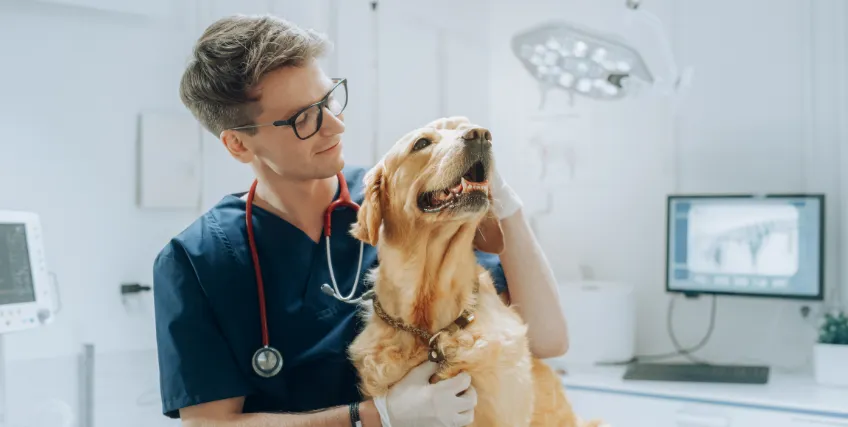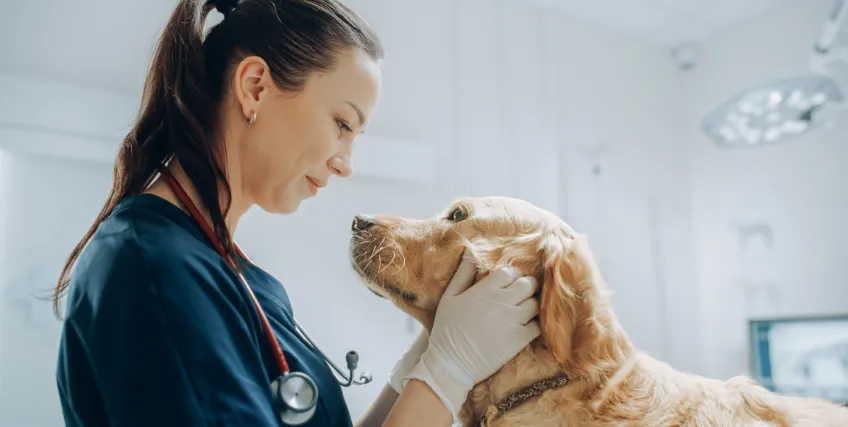Looking for Business Financing?
Apply now for flexible business financing. Biz2Credit offers term loans, revenue-based financing, lines of credit, and commercial real estate loans to qualified businesses.
Set up a Biz2Credit account and apply for business financing.
Key Takeaways:
Ways to find financial help for veterinary care in the U.S. without compromising your pet's health or your budget.
Budget-friendly options such as community clinics, insurance, payment plans, and nonprofit programs that make veterinary care more accessible.
Tips to plan ahead, manage vet bills, and stay financially prepared for both routine and emergency pet care.
If you've ever opened a veterinary bill and flinched, you're not alone. Veterinary expenses can catch even conscientious pet owners off-guard.
For U.S. pet owners seeking to keep their companion animals healthy, without letting vet bills derail the budget, understanding financial help for veterinary care is key. Veterinary care costs are climbing, and many pet owners find themselves wondering how to provide the best care while staying financially afloat.
In this article, discover how you can pursue financial aid for veterinary care and pet care financing options so your pet receives the care they need, without your finances being compromised.
Veterinary Care Costs in the US
According to the American Veterinary Medical Association (AVMA), there are roughly 59.8 million U.S. households owning dogs and 42.2 million owning cats. With such widespread pet ownership, the cost of veterinary care has also been rising over the years. This creates a need for affordable and accessible veterinary services continues to grow.
Routine visits such as vaccinations are usually manageable for most households. However, urgent or specialized treatments like surgeries can be very expensive.
This is why planning ahead for financial help for veterinary care can be very useful.
Budget-Friendly Options to Access Financial Help for Veterinary Care
Caring for a pet brings both joy and responsibility, and part of that responsibility is ensuring access to quality veterinary care. However, the cost of regular checkups, treatments, or emergencies can sometimes strain a household budget. Fortunately, several budget-friendly options can help pet owners manage these expenses more comfortably. Whether you're planning ahead or facing an unexpected bill, understanding your choices for financial help for veterinary care can make a significant difference.
Below are some common ways pet owners across the U.S. find affordable support for their pets' medical needs:
Low-Cost Community Clinics and Mobile Vet Services
Community-based clinics and mobile vet units often provide affordable wellness visits, vaccinations, and spay/neuter services. These programs help reduce long-term costs and make essential care accessible for all pet owners.
Pet Insurance
Pet insurance can help offset costs for unexpected illnesses or injuries. Plans vary, so it's worth comparing coverage types and choosing one that fits your budget and your pet's specific needs.
Monthly Payment and Financing Plans
Many veterinary practices offer payment plans or pet care financing that let you spread costs over several months. Discuss available options with your vet before you apply for pet care credit or any financing program.
Nonprofit and Charitable Assistance
Some nonprofit organizations like Frankie's Friends and The Pet Fund, and local programs offer grants or vouchers for pet owners experiencing financial hardship. While funding availability differs, these resources can provide valuable relief for urgent or necessary care.
Emergency Veterinary Care Grants and Funds
For sudden or critical medical situations, certain clinics and communities maintain emergency funds, or short-term assistance options. For instance, the Magic Bullet Fund is a nonprofit organization that offers affordable vet care for cancer treatment of pets. The RedRover Relief Urgent Care Grants program provide funds for both urgent veterinary care and domestic violence situations involving pets. Crowdfunding and fundraising through trusted platforms or social media can also help gather support for urgent expenses.
Financing Options for Veterinary Clinics
Veterinarians may also need funding to keep their practices running or to grow. Starting or improving a clinic often takes a lot of money, whether it is for buying equipment, renovating the space, or covering staff and supply costs.
Owners who need financial help for veterinary care clinics can look into small business loans or equipment financing options made for healthcare practices. Some of these options are:
Veterinary practice loans to cover setup, renovation, or expansion costs.
Equipment financing for essential veterinary tools such as X-ray machines, anesthesia units, or lab devices.
SBA-backed loans (through the S. Small Business Administration) that offer favorable terms for small veterinary businesses.
With the right financial backing, vets can give better care, invest in new technology and equipment, and offer flexible payment plans for pet owners, making veterinary services more affordable and available in their communities.
Government and Community-Based Assistance Programs for Financial Help for Veterinary Care
While direct federal aid for pet veterinarian care is rare, there are community-and state-level resources that pet owners should know about. These local programs can provide key components of financial help for veterinary care.
Many local animal welfare departments or animal shelters offer low-cost or subsidised programs for pet owners who qualify (especially low-income owners).
While these are typically not major grants for surgery, they address the preventive side.
Tip: Contact your county's animal shelter or humane society, ask for a list of available "pet assistance" or "low-income pet care" programs in your region.
Combining these community options with the previously discussed resources increases your access to financial help for veterinary care.
Comparing Options of Financial Help for Veterinary Care
Here's a breakdown to compare different tools for financing veterinary care:
| Option | Type | Typical Eligibility | How It Helps | Notes |
|---|---|---|---|---|
| Community/Low-Cost Clinic | Local subsidized services | Generally any owner or low-income owner | Reduces baseline veterinary costs (wellness, vaccinations, spay/neuter) | Might not cover emergency or speciality care |
| Pet Insurance | Private insurance policy | Owners of pets who enroll early | Helps cover major or unexpected veterinary expenses, reduces financial risk | Premiums, exclusions and conditions apply |
| Monthly Payment / Financing Plans | Clinic/lender financing | Owners facing larger vet bills | Spreads cost of vet bills via pet care financing, avoiding lump-sum burden | Interest or fees may apply |
| Nonprofit Grants & Charities | Nonprofit assistance | Owners demonstrating financial hardship | Provides direct or indirect grants to assist with veterinary costs | Funds limited, application needed |
| Emergency Grant / Urgent Care Fund | Nonprofit/clinic funds | Pet in urgent life-saving veterinary care | Enables rapid support, avoids delay in emergency treatment | Access narrow, should be emergency part |
Tips to Prepare for Financial Help for Veterinary Care
Build a small emergency fund: Setting aside a modest amount for unexpected vet visits can provide peace of mind when urgent care is needed.
Estimate yearly expenses: Consider regular wellness visits, vaccinations, spay/neuter, and preventive treatments, along with a little extra for unforeseen issues.
Explore pet insurance: If it fits your budget, insurance can be a helpful part of your overall plan for financial help for veterinary care, especially for larger or unexpected vet bills.
Ask about financing options: Talk to your veterinarian about available payment plans or third-party pet care financing programs, and understand the terms before you apply for pet care credit.
Stay organized: Keep a folder, digital or physical with your pet's records, treatment history, and contact details for low-cost clinics or nonprofit programs. Having information ready saves time in emergencies.
Review your plan regularly: As your pet ages or your budget changes, revisit your approach to savings, insurance, and available assistance programs to stay prepared.
Mistakes to Avoid When Seeking Financial Help for Veterinary Care
Even with the best tools, there are common missteps pet owners make. Avoiding these mistakes can help you get the most from your options for financial help for veterinary care:
Waiting too long to seek care. Delay often leads to escalation of cost and risk. Early preventive visits and wellness care reduce the chance of larger bills down the road.
Using high-interest credit cards as your only backup. This can trap you in debt. Instead, consider a structured payment plan or pet care financing that offers better terms.
Not reading the fine print when you apply for pet financing. If you apply for pet care credit (through CareCredit or another lender), make sure you understand interest, fees, missed-payment consequences.
Ignoring routine care because you assume cost is too high. Wellness visits, vaccinations, spay and neuter may seem optional— but they often prevent bigger issues later. Accessing community clinics for low-cost care boosts your ability to maintain regular veterinary services and reduces risk of needing urgent, expensive care.
Relying solely on one tool (e.g., insurance) and not knowing your alternatives. For example, an insurance plan might exclude pre-existing conditions. Knowing about financing, nonprofit grants, and local low-cost clinics gives you more resilience.
Conclusion
As a pet owner in the U.S., you don't have to choose between your pet's health and your financial stability. By embracing a mix of options, you can access meaningful financial help for veterinary care without sacrificing care quality. These options include:
Low-cost community clinics and wellness services that reduce the baseline cost of care.
Pet insurance that helps with larger or unexpected veterinary bills.
Structured payment plans or pet care financing (including apply for pet care credit) that spread cost and avoid shock.
Nonprofit and charitable assistance programs that offer grants or support for those in financial hardship.
Awareness of emergency resources and pre-planning to reduce stress when urgent situations arise.
It's not a one-size-fits-all solution. The most resilient approach is a layered one- combining savings, insurance, financing, and community support. When you plan proactively, your pet has better access to timely veterinary care, and you maintain confidence in your financial footing.
FAQs About Financial Help for Veterinary Care
1. What are some of the best ways to get financial help for veterinary care in emergencies?
In an emergency you can ask your vet about urgent financial help for veterinary care grants or funds, apply for a payment plan or pet care financing through your vet's partner lender, reach out to national nonprofits for grant assistance, and, if needed, use crowdfunding platforms to supplement. Time is critical so ask for cost estimates and term details before proceeding with treatment.
2. How can I apply for pet care credit if I have a low credit score?
Many lenders offering pet care financing have different criteria to evaluate credit scores. You can ask your vet clinic if they partner with a lender that offers financial help for veterinary care. When you apply for pet care credit, look for the lowest interest or promotional rate, and make sure you understand payment terms and what happens if you miss payments. Even with a modest credit profile, you may qualify for a plan with manageable terms.
3. Are nonprofit grants a reliable form of financial assistance for veterinary care?
Nonprofit grants are a helpful resource of financial help for veterinary care, but they are not guaranteed. Funds are often limited, there may be eligibility requirements, and the application process may take time. Therefore, they are widely used as part of a broader strategy like combining insurance, financing and low-cost services, rather than the sole backup.
4. Does pet care financing affect my credit score?
When you apply for pet care financing (or apply for pet care credit), the lender may perform a credit check which could have an initial small impact on your credit score. Also, if you make late payments or default, the account could negatively affect your credit. On the other side, making payments on time can help build a positive payment history.
5. How can I find low-cost veterinary services in my state?
Start by contacting your local animal shelter or humane society and ask for "low-cost vaccine clinics," "spay/neuter assistance," or "subsidized veterinary care." Keep a list of community clinics, mobile veterinary units and nonprofit-supported events. These programs may cover wellness care and reduce your baseline veterinary costs, enhancing your overall access to financial help for veterinary care.




